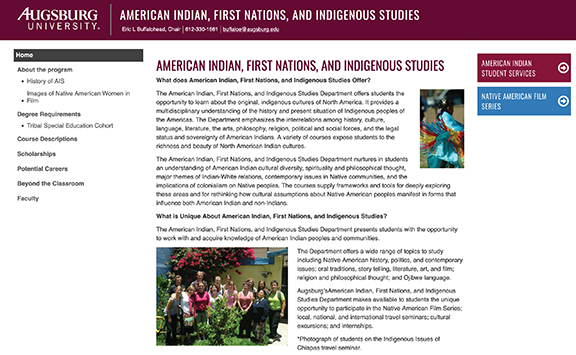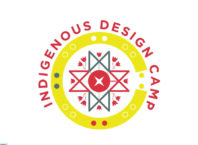By Lee Egerstrom
The launch of the full tuition financial aid program for Native American and Indigenous students at Augsburg University in February (see cover story in this issue) strengthens a circle of support and relevant academic programs at the private university that has been evolving over decades.
“This has been developing for a long time, since the late 1970s and mid-1980s,” said Dr. Eric Buffalohead, associate professor and chair of the American Indian, First Nations and Indigenous Studies program.
With the nearby public University of Minnesota Twin Cities campus, other University branches around the state, and Minnesota State colleges and universities, private Augsburg helps make Minnesota a core national center and leader in educating Native students, he said.
“Minnesota is really in a good place,” he said. “There are Natives all around us. Go in any direction. Minnesota’s (11 federally recognized) tribes are surrounded by tribes in Wisconsin, the Dakotas, Iowa, Nebraska, Montana … anywhere you look.”
Buffalohead, a Ponca from Oklahoma with degrees from the University of Minnesota, has been at Augsburg since 1999. Its long-standing American Indian Studies program was expanded a year ago to become American Indian, First Nations and Indigenous Studies to attract more students and enlarge diversity within the program.
“We want to be more engaged with our neighbors North and South,” he said in reference to Canada’s First Nations tribal identifies and Indigenous peoples across the Americas. That is because Augsburg can, given its private, Lutheran Church affiliated standing.
Most public, taxpayer-supported institutions have limitations on financial assistance programs for out-of-state residents. State boundaries don’t restrain Augsburg.
Financial aid is an enormous hindrance for Native students, Buffaloehead said. But money isn’t the only barrier for students to get private educations and complete degrees in a timely fashion.
Augsburg has academic programs appealing to Native students and programs especially tailored for future tribal and ethnic leaders. It’s Master in arts and leadership program, for instance, has been around for three decades.
At the same time, Augsburg has support programs for Native students in the here and now. American Indian Support Services, created in 1978 to recruit and retain Native students, has recently expanded with parallel programs for other ethnic and under-served demographic student group.
Augsburg boasts that it is a national model and gives the university one of the highest retention and graduation rates for Indian students in the state.
“I hate seeing good students take eight years to get a four-year degree. I’ve known too many students try to take full-time (academic) loads while working 35 hours a week,” he said.
Such experiences make securing a private education, with smaller class sizes and more person-to-person contact with professors, especially challenging for students from minority and lower-income groups.
These reasons, dramatized by Augsburg’s location in the middle of the Twin Cities metropolitan area and surrounded by ethnic neighborhoods on Minneapolis’ South side, have prodded Augsburg to respond to these student needs.
The American Indian Support Services help with guidance counseling for admissions, applications, for securing financial aid, and for orientation and registration. Beyond getting in the door, academic advising and career counseling is offered for developing education plans, for choosing coursework, and, when needed, with intervention and crisis counseling.
There is also community and professional referral support as students prepare to graduate and go out the door.
While Native and Indigenous student numbers still remains at only 2.8 percent of Augsburg’s enrollment, support services and financial aid have produced success. Augsburg counts more than 200 American Indian students among its graduates and has about 80 students enrolled either full- or part-time most years from more than 20 tribal nations.
That, Buffalohead said, should change in the future. “Our enrollment should go up when we can get past the COVID pandemic. Some of our students want the person-to person contact for our courses and that isn’t always possible,” he said.
There is nothing unique about that across academia. Nor across the ethnic landscapes where many in Native and Indigenous communities want to retain close, personal ties. The Buffalohead family is no exception.
The Buffaloheads have a blues band, called Blue Dog, which includes Eric as an instrumentalist; his wife, Joni, as lead singer; and daughter Alexandra, an instrumentalist and singer. They and band member companions have a 2019 album, Take a Stand, nominated for the 2021-2022 Native American Music Awards’ Best Blues Recording award.
Dr. Joni Buffalohead, a veteran administrator at health-related programs with American Indian groups and supportive organizations in Minnesota, is beginning a new position with the Minnesota Department of Education in March.
Daughter Alex, a former Augsburg basketball player and recent Master of Arts graduate at the University of St. Thomas, is the arts and cultural engagement manager for the Native American Community Development Institute (NACDI) in the Native American Cultural Corridor, on Franklin Avenue in Minneapolis.
Mother and daughter are enrolled members of the Sisseton Wahpeton Oyate – two more firm links with the Native community in the Twin Cities and larger Upper Midwest area.
“We realty miss the interaction with people because of COVID. It makes it hard to play gigs” and difficult for normal interaction with students at Augsburg, he said.
The academic program for the American Indian, First Nations and Indigenous Studies degree programs, meanwhile, combine understanding of indigenous cultures, history, language and arts, philosophy, religion, political and social forces or situations, and legal status and sovereignty issues for American Indians.
In addition to courses within the program, related and complimentary courses in anthropology, American Indian history, religion (American Indian Spirituality and Philosophical Thought), and language in Dakota and Ojibwe are available.
Major and minor degrees in the program would be strong pre-professional undergraduate studies for law and other fields. They would be especially helpful for students wanting careers in tribal management or related nonprofit or government positions that work with tribes, Native and Indigenous peoples and groups.
Three upper-level courses for junior and senior students, for example, include Engaging Native Communities, Decolonizing Practices: Reading, Writing Research; and Indigenous Activism and Resistance in the Americas.
To learn more about the American Indian, First Nations, and Indigenous Studies at Augsburg, see: https://www.augsburg.edu/ais.







